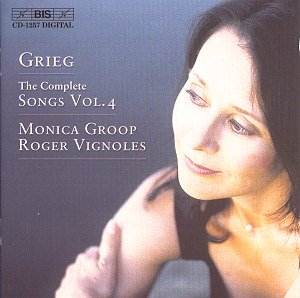Not so long ago I was reviewing a disc of songs by
Carl Loewe in which the composer’s muse seemed to thrive on elaboration.
If you want proof that the simplest art is that which touches us most
deeply you need go no further than this disc of Grieg. On paper these
songs look almost threadbare; often strophic, with simple folk-like
melodies and simple chordal accompaniments. You feel they can never
express the range of moods that some of this poetry contains. And yet
they give the singer all he or she needs to put across the poet’s emotions.
The smallest chromatic twist is all the more telling for its sparing
use and the few moments where the full power of voice and piano are
unleashed are the more effective for their rarity. Above all many, many
phrases tug at the heart in a way not easily explained.
The five Paulsen songs are brief and relatively lightweight
though still touching, but the Vinje settings seem to me a major work.
If not a song cycle in the sense of telling a story – of Grieg’s works,
only Haugtussa does this – they are nevertheless unified in their exploration
of memories, delusions, dreams and aspirations. For all its apparent
simplicity Grieg’s language reaches great heights of subtlety and eloquence,
and leaves no doubt that this is – as the informative booklet notes
explain – a deeply personal response to a difficult period in Grieg’s
life. The poet’s combination of a heartfelt response to nature and a
heavy degree of pessimism will remind English listeners of A. E. Housman.
One of the poems, "First Things", begins "The first thing
you have to do, man,/ Is to die", which reminded me irresistibly
of the immortal parody of Housman (alas, I’ve never known who wrote
it or how it continues) which begins "What, still alive at twenty-two,/
A clean upstanding lad like you!" I couldn’t help wondering if
these Grieg settings were known to George Butterworth, who later captured
a similar folk-like simplicity in his Housman cycles. My only query
is whether the more affirmative final song rings true. The songs without
opus number are minor products but they are all touched with Grieg’s
personality which ensures that even the least of them has a certain
freshness.
Monica Groop has a voice whose darkish mezzo timbre
is nonetheless sufficiently highly pitched to sing the Vinje set without
strain in the original keys rather than the downward transpositions
of the Peters edition low voice version which a mezzo might be expected
to use. My only slight reservation, and I say this with much diffidence,
is that certain phrases, if sung in another language, would seem to
require more of a legato line rather than a note by note approach. But
I am not able to say whether the nature of the Norwegian language affects
this. My other reservation does not regard Groop’s singing as such,
but the subject of Vinje’s poems refers to himself so often as a man
that it seems a little incongruous for them to be sung, however well,
by a woman. Normally complete editions use several singers so as to
pair up each song with the most suitable voice-type, as well as the
right sex, while the pianist remains the same (as in CPO’s Brahms series
with Helmuth Deutsch and their Loewe volumes with Cord Garben). A disarming
feature of this Grieg series is that so far all four volumes have been
sung by Groop, but this is her third pianist in three CDs. I wonder
what she does with them. She would be a fickle young lady indeed if
she has any reservations over Vignoles’s excellent accompanying; all
the same, I shall be interested to see who plays for Volume 5.
Detailed notes, texts and English translations, excellent
recording add to the value of this issue. There are masterpieces scattered
all through Grieg’s song output; since a fair number of them are on
the present disc recommendation becomes automatic.
Christopher Howell


